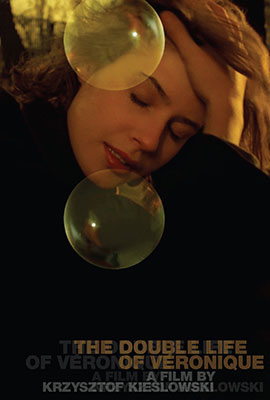
(1991)
directed by Krzysztof Kieslowski
“The Double Life of Veronique” is one of those movies we know was made with joy. Every shot shows a love of cinema and the pleasure of working in it. What a spell this movie casts! Everything about this movie is gorgeous, starting with Irene Jacobs, the actress who plays Veronique. It is impossible to take your eyes off her! Early in the movie, she is singing in the midst of a rain shower. This scene is so incredibly beautiful it always brings tears to my eyes.
“The Double Life of Veronique” is devoted to a single “idea.” What if somewhere in the world there is another person who looks exactly like you? “The Double Life of Veronique” explores the idea of “doubles” with images and sound. It is a film about an “idea” that can only be fully expressed through art.
Krzysztof Kieslowski’s “The Double Life of Veronique” creates art, above all, with the face of Irene Jacobs. She plays a Polish woman named Veronica and a French woman named Veronique. To a large extent, cinema is about the human face. Kieslowski’s camera focuses on Jacob’s face. At different points in the movie, she appears joyous, sad, and in love.
The film begins in Poland. Veronica goes to visit her aunt. During her visit, her flawless voice comes to the attention of a choir director. Veronica is invited to sing at a concert. Before the concert, however, she is in a city square and sees herself boarding a bus. The other woman doesn’t see her.
Veronique is a schoolteacher who lives in Paris. She attends a marionette performance with her students. She sees the puppeteer in a mirror and he sees her. “Papa, I am in love,” she tells her father. Later, her father asks her if she is sad. She answers, “Yes” but can’t explain why she is sad.
“The Double Life of Veronique” is filled with moments of intense beauty. These moments are mysterious and deeply spiritual. There is no need for explanations. The cinematographer, Slawomir Idziak, uses a rich palette with beautiful reds and greens and golden yellows. The final image in “The Double Life of Veronique” is of Veronique’s hand touching a tree.
Krzysztof Kieslowski is my favorite film director. His “Decalogue” was released as ten films of fifty-five minutes each. Each film is based on one of the ten commandments. Similarly, his “Three Colors” trilogy is based on the colors of the French flag. Red is for “Fraternity,” White is for “Equality,” and Blue is for “Liberty.”
My favorite film of the “Three Colors” trilogy is the film “Blue” which stars Juliette Binoche. “Blue” explores the idea of “Liberty.” All of Kieslowski’s films explore abstract “ideas” with images and sound. The results are always mysterious and always very beautiful.